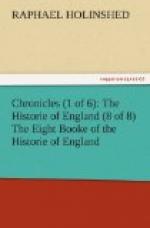[Sidenote: Iaphet and his sonnes. Johannes Bodinus ad fac. hist. cogn. Franciscus Tarapha.] Iaphet the third son of Noah, of some called Iapetus, and of others, Atlas Maurus (because he departed this life in Mauritania) was the first (as Bodinus affirmeth by the authoritie and consent of the Hebrue, Greeke & Latine writers) that peopled the countries of Europe, which afterward he diuided among his sonnes: of whom Tuball (as Tarapha affirmeth) obteined the kingdome of Spaine. Gomer had dominion ouer the Italians, and (as Berosus and diuers other authors agree) Samothes was the founder of Celtica, which conteined in it (as Bale witnesseth) a great part of Europe, but speciallie those countries which now are called by the names of Gallia and Britannia.
[Sidenote: Britaine inhabited shortlie after the floud.] Thus was this Iland inhabited and peopled within 200 yeeres after the floud by the children of Iaphet the sonne of Noah: & this is not onlie prooued by Annius, writing vpon Berosus, but also confirmed by Moses in the scripture, where he writeth, that of the offspring of Iaphet, the Iles of the Gentiles (wherof Britain is one) were sorted into regions in the time of Phaleg the sonne of Hiber, who was borne at the time of the [Sidenote: Theophilus episcop. Antioch. ad Anfol lib. 2. The words of Theophilus a doctor of the church, who liued an. Dom. 160.] diuision of languages. Herevpon Theophilus hath these words: “Cum priscis temporibus pauci forent homines in Arabia & Chaldaea, post linguarum diuisionem aucti & multiplicati paulatim sunt: hinc quidam abierunt versus orientem, quidam concessere ad partes maioris continentis, alij porro profecti sunt ad septentrionem sedes quaesituri, nec prius desierunt terram vbiq; occupare, quam etiam Britannos in Arctois climatibus accesserint, &c.” That is; “When at the first there were not manie men in Arabia and Chaldaea, it came to passe, that after the diuision of toongs, they began somewhat better to increase and multiplie, by which occasion some of them went toward the east, and some toward the parts of the great maine land: diuers of them went also northwards to seeke them dwelling places, neither staid they to replenish the earth as they went, till they came vnto the Iles of Britaine, lieng vnder the north pole.” Thus far Theophilus.
These things considered, Gildas the Britaine had great reason to thinke, that this countrie had bene inhabited from the beginning. And Polydor Virgil was with no lesse consideration hereby induced to confesse, that the Ile of Britaine had receiued inhabitants foorthwith after the floud.
* * * * *
Of Samothes, Magus, Sarron, Druis, and Bardus, fiue kings succeeding each other in regiment ouer the Celts and Samotheans, and how manie hundred yeeres the Celts inhabited this Iland.




